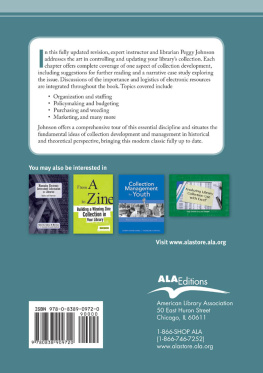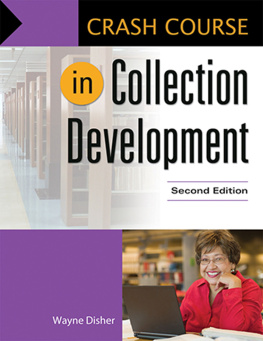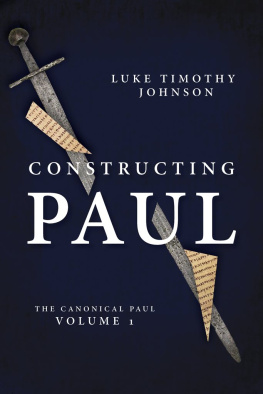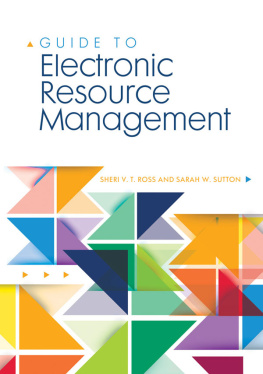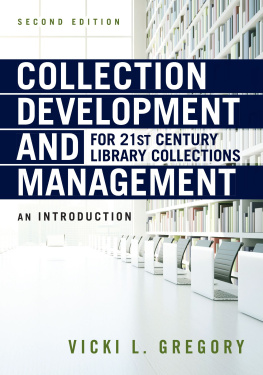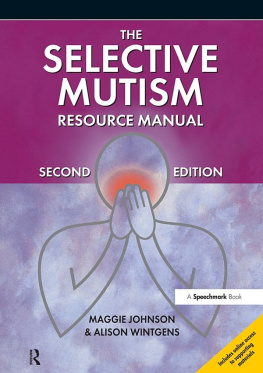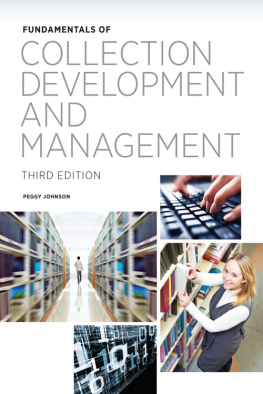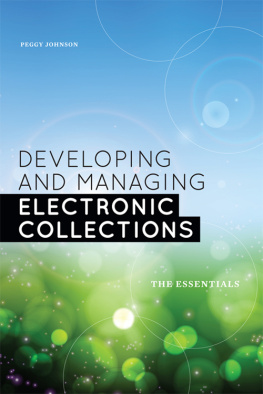FUNDAMENTALS
OF COLLECTION
DEVELOPMENT
AND MANAGEMENT
Second Edition
Peggy Johnson
AMERICAN LIBRARY ASSOCIATION
Chicago 2009
Peggy Johnson is associate university librarian at the University of Minnesota Libraries. She edits two journals, Library Resources and Technical Services and Technicalities: Information Forum for the Library Services Practitioner. She has written or edited six books, including New Directions in Technical Services: Trends and Sources (19931995) (ALA, 1997), The Searchable Internet Bibliography: An On-Disk Annotated Guide to Timely Materials about the Internet (ALA, 1996), and Collection Management and Development: Issues in an Electronic Era (coedited with Bonnie MacEwan; ALA, 1994).
While extensive effort has gone into ensuring the reliability of information appearing in this book, the publisher makes no warranty, express or implied, on the accuracy or reliability of the information, and does not assume and hereby disclaims any liability to any person for any loss or damage caused by errors or omissions in this publication.
The paper used in this publication meets the minimum requirements of American National Standard for Information SciencesPermanence of Paper for Printed Library Materials, ANSI Z39.48-1992.
Library of Congress Cataloging-in-Publication Data
Johnson, Peggy, 1948
Fundamentals of collection development and management / Peggy Johnson. 2nd ed.
p. cm.
Includes bibliographical references and index.
ISBN 978-0-8389-0972-0 (alk. paper)
1. Collection development (Libraries) 2. Collection management (Libraries) 3. Collection development
(Libraries)United States. 4. Collection management (Libraries)
United States. I. Title.
Z687.J64 2009
025.21dc22
2008019989
Copyright 2009 by the American Library Association. All rights reserved except those which may be granted by Sections 107 and 108 of the Copyright Revision Act of 1976.
ISBN-13: 978-0-8389-0972-0
Printed in the United States of America
13 12 11 10 09 5 4 3 2 1
CONTENTS

Additional material can be found at www.ala.org/editions/extras/Johnson09720.


The goals I have in this second edition of Fundamentals of Collection Development and Management are the same as I had for the first edition. I hope this book will serve as an introduction to the topic for both students and experienced librarians with new or expanded responsibilities and as a refresher and resource for those currently performing collection development and management. I have sought to combine history, theory, and practice, drawing from literature outside library and information management when relevant and useful. Although the book focuses on libraries in the United States, the theories and practices presented here are relevant to libraries and librarians wherever they are.
Much in libraries and their collections, in the roles of collections librarians and in the environments in which they operate, has changed since the first edition. Selecting and providing access to digital resources are no longer novel responsibilities, though they remain challenging. The roles of collections librarians are expanding in new and exciting ways. In many libraries of all types, collection development and management are part of a suite of challenging responsibilities. Questions of accountability and impact are put to all types of libraries and their librarians. Reaching out to user communities to understand their needs and interests and to gauge success is more important than ever. This edition aims to recognize the ways that collection development and management are intertwined with all library activities and woven throughout the work librarians do.
When I began work on the second edition, I wanted not only to update the content but also to improve it. To that end, I read published reviews of the first edition and contacted graduate school faculty members who were using it. Critiques of the first edition focused on failure to address collection development and management in all types of libraries evenly. I have sought to make this edition more relevant to public, school, and special librarians. Although electronic resources were new enough when I wrote the first edition to warrant a separate chapter, teaching faculty recommended that this topic be integrated throughout the book, which I have done. I have added a new chapter on scholarly communication, both because faculty requested it and because I believe this topicaccess to the results of scholarshipis of critical importance to all librarians regardless of the type of library in which they work. Finally, in response to requests, I have added more practical information that is intended to aid in the day-to-day work of collection development and management.
As in the first edition, all chapters have supplemental suggested reading lists. These have been extensively revised to reflect print and online literature produced since 2004 and to be more inclusive of all types of libraries. The glossary has been updated and expanded. This edition has four appendixes: A, Professional Resources for Collection Development and Management; B, Selection Aids; C, Sample Collection Development Policy Statements; and D, Contracts and Licensing Terms. The case studies that accompany chapters 2 through 9 are new. The examples are fictional but represent real challenges librarians face daily. I hope these can serve not only as class assignments but also as catalysts for discussion among practicing librarians.
My aim is to provide a comprehensive examination of the key issues in collection development and management today. Each topic could be explored in greater depth, and most warrant and have received book-length treatment, many of which the reader can find in the supplemental reading lists. I hope all readers find useful, practical information in this revised edition of Fundamentals of Collection Development and Management.

Writing a book on collection development and management offers two challenges what to include and what to exclude, not unlike the practice of collection development and management itself. Entire books can be and have been written on the topics addressed in each chapter in this book. Within the limitations of a single book, my goal is to introduce the theory and practice of collection development and management and to present each of the responsibilities that fall within it. In addition, chapters contain a brief history of how these responsibilities and topics have evolved along with the major influencing factors.
Collection development and management are the meat and potatoes of libraries. If you dont have a collection, you dont have a library. In the earliest libraries, people concentrated on building collections and locating materials to add, though the need for preservation has been with us for the duration of libraries. Medieval monks often spent their entire lives copying manuscripts to preserve themand creating questions about the mutability of content similar to those that trouble us today.

